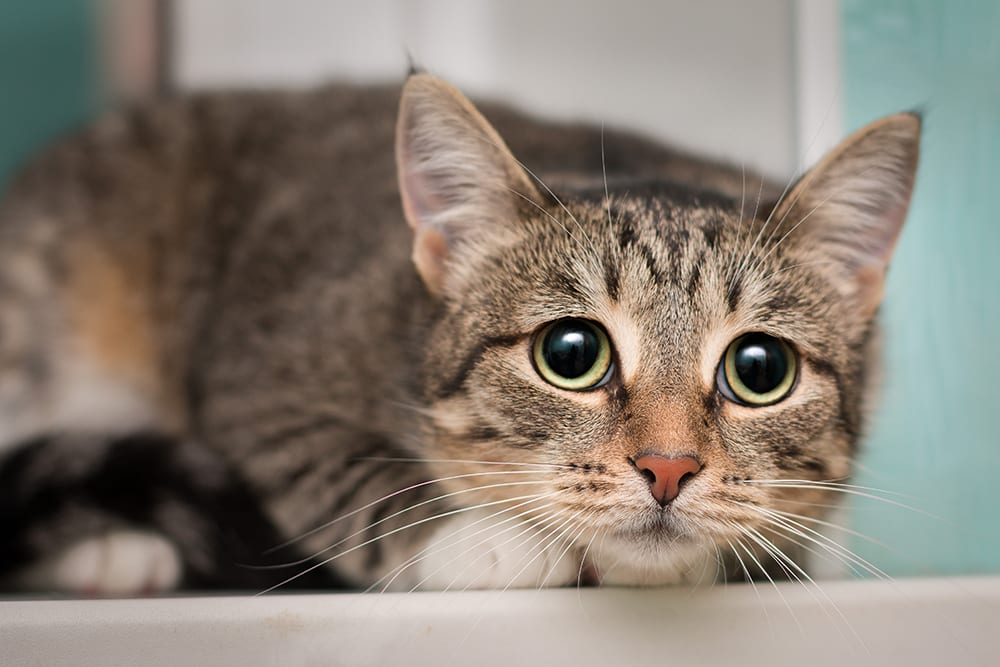Pet Care
Cat Coughing, Sneezing & Wheezing
Why Cats Cough
If your cat has a recurrent cough it’s bound to be upsetting for both you and your kitty. Often when cats are coughing they become agitated and apprehensive, making it appear as if each cough will be their final breath.
If your cat has an ongoing or severe cough it’s time to head to the vet! Cat coughs can be a sign of a serious underlying illness. Your vet will be able to diagnose the cause of your cat’s cough so that treatment can begin.
To determine the right treatment for your cat, the vet will need to determine the underlying cause. The nature of your cat’s cough along with other findings can help your vet to diagnose the cause of your cat’s cough and prescribe appropriate treatment.
Causes of Cat Coughing, Wheezing & Sneezing
There are a number of different reasons why your cat may be wheezing, coughing or sneezing. Below are a few of the most common:
Cat Colds
Cat colds are upper respiratory infections characterized by all the same symptoms as the human cold including coughing, sneezing and wheezing. Cat colds can be caused by either bacteria or viruses and although these infections are not contagious to humans, they are very easily transmitted between cats, especially in crowded conditions.
Asthma
Asthma is the most common feline respiratory disorder that our Clemmons veterinarians see. Cats who spend at least part of their time outdoors are more likely to develop asthma and may experience coughing and wheezing as symptoms of the condition.
Allergies
Much like their people, cats often suffer from allergies that make them cough and sneeze or wheeze.
Fungal Lung Infection
If your feline friend spends time outdoors they face an increased risk for a fungal infection. Fungal infections can result in coughing and other symptoms. When caught early fungal infections are typically easy to treat.
Heartworms
Heartworm disease is a deadly condition spread by mosquitos. Preventative medications are available from your vet that can help to protect your cat against this extremely serious disease.
Lung Cancer
Coughing can also be a sign of lung cancer in cats. Some lung tumors can be controlled with medication. If not, surgery may be an option for some cats.
Pneumonia
Cat coughing can be a sign of pneumonia. Pneumonia in cats can be diagnosed with x-rays and may respond to antibiotics and other therapies.
Congestive Heart Failure
Signs of congestive heart failure in cats include shortness of breath, coughing or wheezing. If your cat is struggling to breathe it’s time to see your vet. Heart failure can be diagnosed using ultrasound or electrocardiogram.
Tight collars
A tight collar can put pressure on your kitty’s windpipe causing damage and leading to a cough.
Worms
Worms are particularly common in felines. It’s one reason your kitty should have regular blood and fecal tests at the vet. These tests can help to detect parasites early when they are most easily treated.
Treatment for Cat Coughing
Treatment for coughing and other breathing problems in cats will depend upon the underlying cause. Do not try to treat your cat without the guidance of your vet. After your cat has been thoroughly examined, your vet will recommend appropriate treatment options. Your cat’s treatment for coughing may include cough suppressants, antibiotics, steroids or other medications.
Note: The advice provided in this post is intended for informational purposes and does not constitute medical advice regarding pets. For an accurate diagnosis of your pet’s condition, please make an appointment with your vet.
If your cat has a severe or recurrent cough, contact our Clemmons vets right away. Our vets can diagnose your kitty’s condition and provide you with effective treatment options quickly.
Looking for a vet in
Clemmons?
We’re always accepting new patients, so contact our veterinary hospital today to book your pet’s first appointment.
Related Articles View All
How to Tell if Your Cat Has a Broken Leg
Regardless of whether your cat is a curious outdoor explorer or a chilled-out homebody, accidents can happen. Today, our Clemmons vets share signs that may indicate that your cat has a broken leg, and what you should do.
Signs of Pain in Cats & How to Help
To provide your cat with all the care they need to live a long and healthy life, it’s important to be able to spot the signs of pain early and know what to do. Below, our Clemmons vets offer some advice on how to tell if your cat is in pain, and what you can do to help.
My Cat is Sleeping Constantly: Is this Cause for Worry?
Cats, without a doubt, enjoy sleeping. Concerned cat owners frequently ask our Clemmons veterinarians if they should be concerned that their cat sleeps so much. When does a cat nap signal the possibility of a medical emergency?
A Pet Parent’s Guide to Cat Dental Care
Cats are as likely as people to suffer from painful dental health issues caused by injury or poor oral hygiene. Unfortunately, many cat owners don’t know what dental care for cats involves or how to care for their feline friend’s oral health. In today’s blog, our Clemmons vets explain how to clean your cat’s teeth and care for their oral health.







